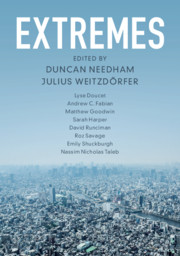Book contents
- Extremes
- The Darwin College Lectures
- Extremes
- Copyright page
- Contents
- Figures
- Tables
- Notes on Contributors
- Acknowledgements
- On the Notion of ‘Extremes’
- 1 Dealing with Extremism
- 2 Extreme Weather
- 3 Probability, Risk, and Extremes
- 4 Extreme Rowing
- 5 Extremes of War: Stories of Survival from Syria
- 6 Extreme Politics: The Four Waves of National Populism in the West
- 7 Extreme Longevity
- 8 Extremes of Power in the Universe
- Index
- References
2 - Extreme Weather
Published online by Cambridge University Press: 08 March 2019
- Extremes
- The Darwin College Lectures
- Extremes
- Copyright page
- Contents
- Figures
- Tables
- Notes on Contributors
- Acknowledgements
- On the Notion of ‘Extremes’
- 1 Dealing with Extremism
- 2 Extreme Weather
- 3 Probability, Risk, and Extremes
- 4 Extreme Rowing
- 5 Extremes of War: Stories of Survival from Syria
- 6 Extreme Politics: The Four Waves of National Populism in the West
- 7 Extreme Longevity
- 8 Extremes of Power in the Universe
- Index
- References
Summary
- Type
- Chapter
- Information
- Extremes , pp. 24 - 45Publisher: Cambridge University PressPrint publication year: 2019

